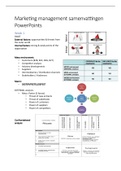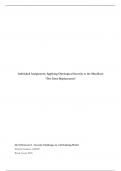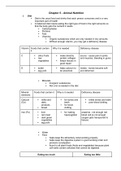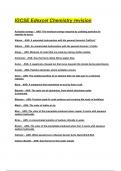Gebleven bij de paarse titel, titel in lecture 6
Concept/term/construct
Conceptualization: making clear what you mean by your theoretical construct.
Facets
Operationalization: Exact procedures for data collection within the context of a specific data
collection method. Find a way to identify.
Operationalizeren: uitleggen hoe je het gaat meten/ hoe ga je erachter komen?
Indicators
Measurement: following the specified procedure for data collection.
Observations
Lecture 1
Induction: Sometimes it is argued, we better start with ‘observing’
Deduction: starting with thinking in research and building the rest of the research on what we think
Confirmation bias: Despite all the mistakes he is making, the fact that he is cheating and the lousy
things he is doing, I still think my friend is one of the best people in the world ….
The empirical cycle => about doing research
Focus on empirical research: doing research with data.
What is empirical research
Empirical research: systematically answering empirical questions.
Systematically: excluding the possibility that other answers are better than the answer we
give.
Empirical: about things we can observe.
How do we arrive to a specific answer? => that is what systematic means.
Procedure:
The relationship between questions and answers.
There are several steps:
Thinking: we think about possible answers to our question.
Planning: we decide how we can test what we think.
Observing
Analyse: this is to arrive to some conclusions.
In research design these words are a bit different:
Thinking Theory
Planning Research design
Observing Data collection
Analyze Data analysis
1
,Empirical cycle:
Deduction: starting with theory and then thinking how we can test the theory
Induction: starting with data and then trying to arrive to conclusions on the basis of data.
Wheel of science
Not a logical sequence with steps. Anything goes.. you can start with data, you can start with theory,
or with the question.. It does not matter.
What matter: if you defend your conclusions => logical sequence of steps.
Example: what causes cholera?
The research design is: Dr. Snow (the researcher) decided to compare households that used different
waterpumps, including the much-frequented street-pump in Broad Street. He compared households
with fouled with households with no fouled water (huishoudens met wel/geen vervuild water).
Data collection & data analysis: Dr. Snow (the researcher) tracked down information from hospital
records on when the outbreak began and whether the victims drank water from the Broad Street
pump.
Decision making and research questions
Example: smoking among teenagers
RQ: How to reduce the number of people that start smoking?
Empirical research questions are research questions that can only be answered using observations.
Context of empirical research questions
Empirical research questions are often asked in the context of decision making.
Decision making:
2
,Decision making gives rise to empirical research questions.
“How to” questions can be broken up into descriptive and explanatory research questions.
Example: how to reduce the number of people that start smoking?
This question is difficult to answer. But with descriptive and explanatory questions this question is
more easy to answer.
Explanatory: You ask for the causes.
Confirmation bias
Understanding
“confirmation bias” (also called: =Myside Bias = cherry picking)
Frequently made mistake in politics, business, social relationship, social science, psychology.
The extreme case of confirmation bias is conspiracy theories.
What to do about confirmation bias?
Definition of confirmation bias: search for, analyze and recall information in a way that conforms
preexisting beliefs, while giving disproportionalety less consideration to alternative interpretations.
3
, You constantly look for information that confirm what you already believed.
That affect the things we do: if we believe certain things, we act upon them.
Affects what we think is true, and therefore it affects what we do.
Three types of confirmation bias
Information Reasoning Conclusions
We search for information for example, that agree what we thought.
We only “find” those things what we expected to see.
Politics: Pearl Harbor (ignoring alaming signals, because VS thougt they were unconvincable
(onoverwinnelijk))
Crime: looking for evidence (the case of Lucy de B.) => Look for evidence that confirms your pre-
existing believe. You have to look for evidence, but you also have to think about that you can be
wrong.
Business: groupthink.
Psychology: halo and horn effects. Horn effect: you think that someone is bad, and then you see him
do bad thing, while he didn’t do bad things. Halo effect: you think that a person is nice; no matter
what she does, you still think that person is nice.
Social science: looking for examples of what you want to show as proof; ignoring examples that refute
your ideas. You also have to look for things that are disproving your ideas.
Publication bias: only publishing articles that CONFIRM long held hypotheses.
Why is confirmation bias so strong?
Limitations in humans, relying on ‘heuristics’. => thinking is difficult and we all have kinds
of simplifications when we try to understand the world.
Wishful thinking
Consistency (between initial evidence and new evidence). => the new evidence has to be
confirming what we already thought.
Consequences of confirmation bias
Mistakes in knowledge
Bad decisions
Avoiding conformation bias
NOT intelligence (no relationship found!)
Systematic data gathering, being aware of what can go wrong
Explicit and complete reasoning
4







